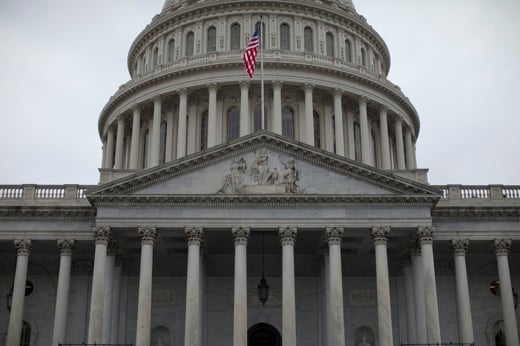Capitalism, the free market no longer at work; making sense of the 'new normal' nearly impossible
Have you noticed how the needle of that market compass you inherited swings randomly from North to South and back again, no matter how often you recalibrate?
We're not in Kansas anymore, Toto, no matter how hard the equity market clicks its ruby-slippered heels together. The new normal is anything but; it's old -- three years old, to be precise -- and it's downright weird.
“Nothing we are seeing in a post-bubble credit collapse is normal,” according to David Rosenberg, the chief economist at Gluskin Sheff & Associates Inc. in Toronto. He is one of the few soothsayers who correctly divined the credit crunch while it was happening, in his previous job at Merrill Lynch.
On Aug. 9, 2007, petrifying money markets spooked the European Central Bank into handing 95 billion euros ($125 billion) to the banking industry. That turned out to be just the first installment of a global blank check to stuff the holes in finance with taxpayer money via government intervention.
If you believe the equity market, that cash is delivering economic salvation, with the Standard & Poor's 500 Index recouping losses to rest little changed for the year. Look at the bond market, however, and record low yields on two-year Treasuries and 10-year German bunds suggest the future looks a lot more like a zero-growth world slip-sliding into deflation and the dreaded double-dip recession.
Planet Madness
Whatever is going on in the world of finance, it isn't capitalism or a free market. Paul Brodsky and Lee Quaintance of QB Asset Management in New York reckon markets are now at the whim of “the vagaries of the subjective central bank decision-making apparatus as a capricious pursuit posing as systematic.”
The defining feature of tyranny, they argued in a research report this week that channeled the author Christopher Hitchens, is the unpredictability of its rules -- a valid description of the current market environment.
“The path of global markets will be determined by policy makers and politicians, not by natural economic incentives or even by policy makers resetting our ‘animal spirits,'” they wrote.
Tim Price, the director of investments at PFP Group in London, says the credit crisis has destroyed “the boundaries of possibility.” Faith in credit ratings, government debt, economic Darwinism, regulation, and the enlightened self- interest of banks and bankers has vanished. As a result, “literally anything is possible,” he says.
Scary Sirens
A feature of the credit crisis was how tiny alarm bells started jingling everywhere in the prior months, just softly enough to feel like they could be safely ignored. Listen hard today, and an entirely different suite of scary sirens is discernible through the noise of allegedly optimistic company earnings reports.
The U.S. government bullied BP Plc into canceling its dividend for the first three quarters of this year and cajoled it into setting up a $20 billion fund to compensate victims of the Gulf of Mexico oil spill. That's stealing from the company's shareholders; President Barack Obama has no jurisdiction over BP's treasury, no matter what your moral stance is on seabirds.
Moreover, it looks like the U.S. plans to tweak the rules governing Fannie Mae and Freddie Mac to enhance the pace of mortgage forgiveness. In other words, it will force the now government-controlled agencies to let debtors keep their houses without making all of their debt payments.
Bondholders Get Robbed
That's stealing from Fannie and Freddie's bondholders, whatever you think about the behavior of mortgage lenders in the go-go years. Ireland is also planning rule changes to make it harder for mortgage companies to foreclose on defaulters, according to the Irish Independent newspaper.
And in the U.K., the government is pushing commercial banks, many of which it controls as a result of various bailouts, to boost their lending. Never mind that the very arbitrariness of state intervention might be what is making entrepreneurs shy away from making fresh investments. If enforced, the government will be stealing from the banks' other shareholders by forcing executives to make loans they otherwise wouldn't touch, just to meet politically determined quotas.
When politicians steal from their constituents, your market compass is useless at guiding investment decisions.
Last week, another distress buzzer went off in the corporate-bond market. International Business Machines Corp., the world's biggest provider of computer services, borrowed $1.5 billion for three years. The company, rated four levels below the top grade at A1 by Moody's Investors Service, is paying an interest rate of just 1 percent for its money.
Bond Echoes
I remember writing in 2005 about former typewriter maker Olivetti borrowing $1 billion for 50 years in its new guise as Telecom Italia; that debt now trades at about 82 cents on the dollar. I also remember seeing Pawel Kowalewski, Poland's asset and liability manager, in October of that year trying and failing to hide his disbelief at selling 500 million euros of 50-year debt at just 4.25 percent; those bonds are currently worth about 79 cents apiece.
It would be a step too far to suggest the IBM deal heralds another credit crisis in the making. Maybe lending to IBM for three years at 1 percent makes sense when the two-year Treasury note yields about 0.5 percent. Maybe. But it sure feels wrong.
One final cheery thought. Check out the recent 50 percent jump in the price of wheat. Now ask yourself which government has paid the most attention to food and water security in recent years. Then recall that half-formed plan you had to follow the advice of legendary investor Jim Rogers and teach your offspring to speak Mandarin.
(Mark Gilbert, author of “Complicit: How Greed and Collusion Made the Credit Crisis Unstoppable,” is the London bureau chief and a columnist for Bloomberg News. The opinions expressed are his own.)







